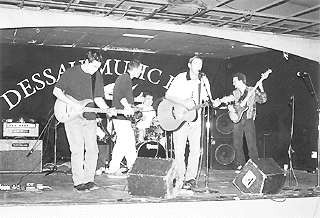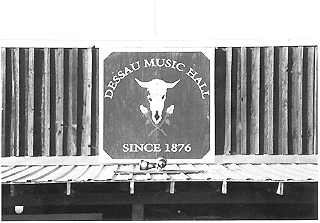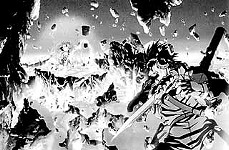Cum On Feel the Noize
The New Dessau Music Hall
By Jay Hardwig, Fri., April 24, 1998
|
|
The Dessau Music Hall used to stand in the middle of nowhere. Now it stands in the middle of a cluster of $100,000 tract homes, ground-munching behemoths that stand in arrogant contrast to the more subdued rolling fields that are quickly fading reminders of the area's rural past. Soaring Ceilings!, the signs fairly shout, Exciting New Designs! Pflugerville Schools! Tucked behind thick brick walls and endowed with impressive square footage, they are the instant communities that have sprouted with the growth of the high-tech industry north of Austin. Times are changing, and Dessau Music Hall aims to change right along with them. Perhaps you've noticed the ads in the Chronicle, advertising Delbert McClinton, Ruben Ramos, and George Devore. Thursdays are blues nights, Saturdays country, and Wednesdays, up until last week, were devoted to metal. And on April 23, tonight - perhaps as you read this - Quiet Riot will be loading in for a one-night only, $15 show at Dessau Music Hall. Quiet Riot! At one of central Texas' grand ol' country dance halls, a place widely renowned for its fine wood waltzing floor, cozy red ambiance, and contempt for line dancing? Can it be? And who in their right mind thought it would be a good idea to introduce a has-been hair band to the point and pride of the country crossroads known as Dessau?
John Persinger, that's who. As co-owner and prime booker for the Dessau Music Hall, John Persinger is the man who snatched the fax off his desk, brought it into his brother Mike, and said, "What do you think of Quiet Riot?" The rest, as they might say, will soon be history. Then again, to those that have watched closely, this comes as no surprise.
Since the Persinger brothers bought the damn-near-boarded-up Dessau Music Hall last April, located in the township of Dessau (the other side of the street is in Austin), the variety of acts to grace its stage has increased tenfold. What began as an occasional event - Freddy Fender in September, Delbert McClinton and "Polly Hatchet" in October (er, that's Molly Hatchet, Mike) - became general policy with the New Year. By that point, the two brothers had noticed that the traditional country audience was fading fast; from now on, Dessau Music Hall would book whoever they damn well pleased.
"Our policy is just not to limit ourselves," explains Mike Persinger. "It's too big a building to limit ourselves to only one kind of music. I don't have anything against country music, but the people who listen to country music are a real small portion of the live music fans in this town."
Mindful of the loyalists, the Persingers didn't scrap country music altogether; instead, they consolidated their efforts onto one night, Saturday, and committed to booking higher-profile acts for that night. The rest of the week has become open season, though, and Dessau has been booking Austin rock and blues favorites such as Storyville, Jimmie Vaughan, Kelly Willis, and Joe Ely (all on the docket for May), as well as country favorites Junior Brown and the Derailers. Seems that from the very first Storyville show, the Persingers tapped an audience starved for music.
"When they told us we were playing out there, I didn't know where it was," admits Storyville guitarist David Grissom. "It was kind of an unknown quantity. But when we got there, the parking lot was overflowing - there were probably 600 people there. I looked out in the crowd and I didn't see anybody I recognized. It's a totally different crowd than at Antone's or Liberty Lunch."
A Dessau show, Mike Persinger says with a pinch of self-interest, can increase a band's audience by bringing in folks reluctant to head downtown for a late-night show. It's almost like a different city, Grissom figures, except its only 15 minutes away. And Persinger is not apologizing for Quiet Riot; indeed, he's planning a $2,000 upgrade to the sound system just for the show. "It's a great band," he insists, "and it's just music you don't hear all the time here in town."
And yet, there's something unsettling about an Eighties-era heavy metal band headlining one of the hoariest country dance halls in Central Texas. Has a classic honky-tonk been compromised by the dictates of market research? To answer that question, a fuller look at the history of the Dessau Music Hall is in order.
To start with, you have to go back more than 120 years. According to legend - and most of the history of Dessau Music Hall is closer to legend than confirmed fact - the first Dessau dance hall was built in 1876 by a homesick immigrant from Dessau, Germany. That hall, an attractive two-story affair set close to the corner of what is now Old Dessau Road and Howard Lane, burned to the ground around 1940.
A second Dessau Music Hall was built (in from the corner but still hard by Old Dessau Road), and was famed for the stately pecan tree that stretched from the middle of the dance floor and out the roof of the building. This one, too, burned down in 1967, taking the tree with it. What to do but to build another? The third, built in 1969 by Arkie Sawyer and Leona Kincl, stands today.
Developing a reputation as a big-band hotspot in the Thirties, the first hall seems to have been a swinging place. The oldest artifact on the site is a rusted iron cage that held Dessau's various scofflaws: If hard time was in order, the cage was propped on a horse and buggy and carted to Huntsville. Another relic is a poster advertising a stag show staged by the Veterans of Foreign Wars sometime in the Forties. 14 Big Acts! the poster shouts, among them Billie Shonae, the famous Flame of New Orleans. The holder of the lucky donation ticket won a $50 savings bond.
It was during Leona Kincl's tenure (1969-1991) that Dessau Music Hall got its reputation as a no-nonsense country dance hall. She ran a clean show, by all reports, and permitted no foolishness. Men were not to wear hats inside, and at least in 1969, women were not allowed to wear pants: One published story reports of a woman in jeans who, rather than leave the hall, took her pants off and handed them to the doorman, waltzing on in as she did. She was not bothered for the rest of the night. And when the producers of The Best Little Whorehouse in Texas asked to use the hall in their film, Kincl refused, not wanting to disrupt the habits of her regular patrons, who wouldn't be allowed to come around during filming.
Over the years, a lot of great acts came through. Glen Miller, Woody Herman, Guy Lombardo, Tommy Dorsey, Artie Shaw, and Stan Kenton all graced the Dessau stage; the country lineup included Bob Wills, Charlie Louvin, Loretta Lynn, and a fella named Hank Williams. (One poster advertises a pre-longhair Willie Nelson and Waylon Jennings show: $6 and all-you-can-drink free beer.) Jimmy Heath was so impressed that he wrote "The Dessau Waltz" and dedicated it to the place.
|
|
The Dessau Music Hall was a far cry from those glory days when the Persinger brothers bought it from Tom West and Larry and Wilma Repert in 1997. The first thing they did was to take down the red velvet wallpaper and red chandeliers that gave the place such a distinctive look (and presumably attracted the Whorehouse producers to the site). Imagining a Texas-style house of blues, the Persingers added a front porch, expanded the seating area, raised the stage, brought in smaller tables, got a liquor license, built a few bars, and bathed the place in neon. They kept the dance floor - renowned as one of the largest in Central Texas - but scuttled the traditional format. They started booking rock and blues acts, and now a year later Quiet Riot will take the stage that once held Tommy Dorsey and Hank Williams. Has a country landmark been compromised?
"Not at all," claims Mike Persinger, pointing out that the Reperts rarely brought in live music, making money mostly from weddings and private parties. "I think the really important thing to think about is that this place was more or less closed for two years, [except] for private parties. So it was already dead. We didn't turn around and take a building that was taking a thousand people and putting them in here every Wednesday, Thursday, and Friday night to country dance, and turn around and say, `No, we want to do different music, get out of here.' They had no audience. And now when you look around to what has happened in this area, the audience isn't primarily people who want to turn around and boot-scoot and honky-tonk and stuff like that. They want variety.... It's a more urban crowd."
Persinger argues that he is not forsaking tradition; rather, he's renewing it. "The way I look at it," he says, "we've taken a classic honky-tonk that was closed down and we've resurrected it. We're filling it with people listening to music, and that's what this building has done for 100 years."
And yet as John Kelso wrote in a 1984 Austin American-Statesman article, perhaps it's true that the cha-cha, rumba, and foxtrot is as much a part of Dessau's history as the Texas two-step. Perhaps, as Persinger claims, Dessau's true heritage is not as a country dance hall but as Austin's original roadhouse, with a tradition of bringing diverse music to diverse folks. Yet when red chandeliers are forsaken for a mirror ball, when bring-your-own gives over to one-dollar kamikaze shots, then, perhaps, something has been lost. And what sort of identity can be forged when a Quiet Riot show is followed by Lonesome Dove, the Scabs by Don Walser?
"Time does change things, and people do change too," says Gil Jenkins, veteran of the W.C. Clark Band and current drummer for the Crawlers, one of Dessau's regular blues bands. Noting a more relaxed atmosphere and a management team committed to live music, Jenkins likes what he sees in Dessau these days. "My personal opinion is that it's for the better."
On a recent Saturday night, the dancers seemed to agree. Character for character's sake will only get you so far if no one is coming in the door, and it seems quite possible that any fondness for the idiosyncrasies of the old Dessau Music Hall belongs more to the jaded Austin hipster searching for kitsch appeal than the regular patrons that are the arena's bread and butter.
For their part, the regulars aren't complaining; in fact, they're thrilled with the recent changes at Dessau Music Hall. Many go out of their way to talk about the relaxed hospitality of the new hall, and about the dramatic jump in the quality of the music. Even former owner Tom West is grateful for what the Persingers have done, saying simply, "It's been saved." And what became of the famous red wallpaper?
"I'm sure it's still in there, under the paneling, says Persinger. "[But] nobody misses it. Absolutely nobody misses it."









